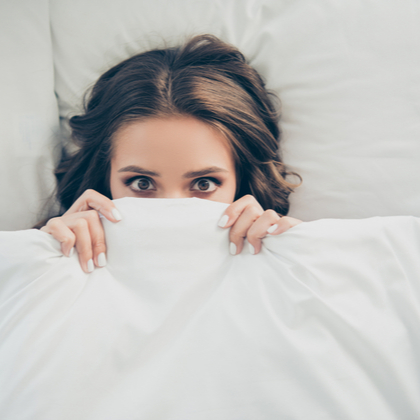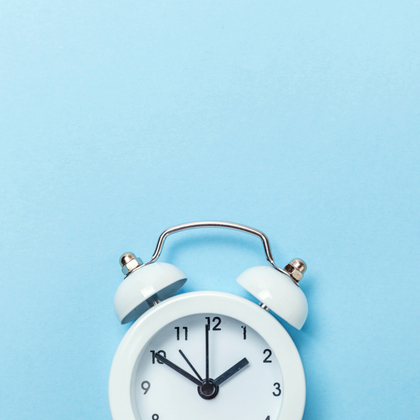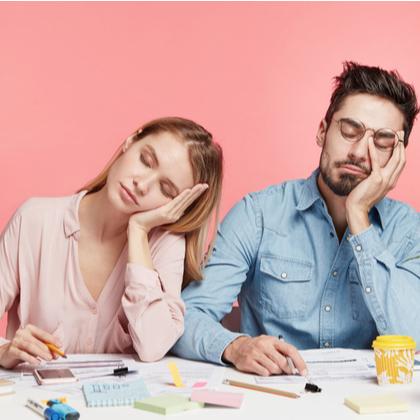
There’s nothing more frustrating than feeling tired but struggling to sleep. And a night of poor sleep can quickly snowball into fatigue, irritability, and anxiety the next day, which can then perpetuate a vicious cycle of more sleeplessness and stress.
There are many reasons why you might be tired but can’t sleep. Understanding and identifying these factors is an important step in supporting your sleep hygiene and overall health.
Why am I tired during the day?
According to sleep experts, overtiredness often stems from our unhealthy relationship with technology. Many of us have lost the rituals and practices needed to prepare ourselves for high-quality sleep. Instead of prioritising downtime, we’re catching up on TV shows, scrolling social media, or answering work emails.

Increasing cases of anxiety and insomnia, an over-reliance on caffeine, and hormonal fluctuations in the case of women are also to blame for sleep trouble and fatigue.
Stress and anxiety
One of the biggest barriers to sleep is stress and anxiety.1 At night, many people – especially those with anxiety conditions, like panic disorder – find themselves in a state of mental hyperarousal, ruminating about the past and catastrophising about the future.
Experiencing anxiety at night is particularly disruptive because it confuses your 24-hour internal biological clock or circadian rhythm. The body naturally secretes the stress hormone cortisol throughout the day: levels spike shortly after waking and gradually dip in the evening. Nocturnal anxiety and stress throw this system out of whack, increasing cortisol when it should be declining to make way for melatonin, your sleep hormone. This physiological change keeps you stimulated and alert and might explain why you feel tired but can’t sleep.
Poor sleep and mental health issues are complex since they often have a bidirectional relationship. This means anxiety and stress can cause sleep deprivation, leading to more anxiety and further sleep problems. Depression and sleep issues have a similar reciprocal association.
Hormonal imbalances
If you’re a woman, experiencing hormonal changes could be another reason you’re tired but can’t sleep at night. The hormonal fluctuations that happen just before menstruation can reduce REM (rapid-eye-movement) sleep, decrease melatonin production, lead to mood changes, cause painful menstrual cramps and migraines, and increase body temperature – all of which can contribute to increased difficulties falling asleep, as well as more night-time arousals2.
Experiencing symptoms of perimenopause may also explain why you feel tired but unable to sleep. As you enter perimenopause, levels of oestrogen and progesterone – hormones involved in the sleep-wake cycle – start to decline and impact your sleep quality3.These hormonal fluctuations can also lead to night sweats and increased anxiety, making it harder to sleep, even if you’re tired.
Caffeine
If you need five strong coffees to get you through the day, your caffeine habit may be keeping you up at night. A widely consumed stimulant, caffeine is known for extending sleep latency (the time it takes to fall asleep), diminishing sleep efficiency, reducing total sleep time, and worsening sleep quality4.
Caffeine also has a quarter-life of twelve hours. This means drinking anything caffeinated past midday means you’ll still have a quarter of that caffeine in your system around bedtime, which means you may feel tired but ‘wired’ and unable to sleep.
Electronic devices
Your internal circadian rhythm is governed by light and darkness signals. Light cues activity; darkness cues rest. However, using electronic devices too close to bedtime disrupts this natural biological rhythm.
Screens and electronic devices emit blue light, which suppresses the production of melatonin, your sleep hormone. The blue light glaring from your gadgets tricks the brain into thinking it should be awake, making you feel energised when you should be feeling sleepy5.
Online content can also be stimulating and may even spike your stress levels before bed, which isn’t conducive to high-quality rest.
Insomnia
Insomnia is generally defined as experiencing difficulty falling asleep, maintaining sleep throughout the night, or waking up too early in the morning. You can experience acute insomnia – which lasts for a few weeks or days – or chronic insomnia – which persists for upwards of three months.
There are many causes of insomnia. Often, people with insomnia find themselves in a cycle of sleeplessness and anxiety because they develop negative associations with their bed and bedroom, which become places of wakefulness, not rest. This psychological barrier means insomniacs often feel tired but can’t sleep.
Circadian rhythm disorders
Our 24-hour internal clock, or circadian rhythm, is synchronised with natural light and darkness cues and bodily hormones, making us diurnal creatures, hardwired to operate during the day and sleep at night.
Circadian rhythm disorders occur when there’s a misalignment between the light-darkness cycle and the 24-hour internal clock. And without proper signalling from the internal body clock, you can experience insomnia symptoms and excessive daytime fatigue.
Circadian rhythm disorders can vary in severity: jet lag is a mild form, while shift work disorder is more debilitating. If you work night shifts, your schedule can leave you fighting against the dials of your internal body clock. That’s why the traditional 9-5 working hours are the most conducive to our sleep-wake cycle; anything that falls outside this window can disrupt and confuse our internal timekeeping system.
Should I stay up all night if I can’t sleep?
Where possible, avoid staying up all night if you can’t sleep. Sleep deprivation affects every area of your physical, emotional, and mental health. Plus, it can start a negative feedback loop of anxiety and insomnia, which often go hand in hand.
Instead of resigning yourself to a sleepless night, try this: if you can’t sleep after 25-minutes, get out of bed and go to a different room. Don’t check your phone, don’t eat, and don’t turn on the main lights – these actions will only trigger your body to wake up. In dim lighting, read, do something mindful: read, practice gentle yoga, or fold laundry. Only return to bed when you feel sleepy – there’s no time limit on this. Gradually, your brain will relearn the association that your bed and bedroom are places of solid, restful sleep.
It can be helpful to think about this analogy: you never sit at the dining table waiting to get hungry, so why should you lie in bed waiting to get sleepy?
Lastly, never berate yourself for not being able to sleep. Negative self-talk will only keep you awake. Instead, try to practice acceptance: everyone has a bad night’s sleep now and again. And that’s fine.
As societal pressures increase and technology developments advance, there will be many things that risk coming between you and a good night’s sleep. But living in a way that’s conducive to sleep – supporting your mental health, making smart lifestyle choices, and cultivating a healthier relationship with technology – means you can improve your sleep quality and ensure you wake energised and refreshed every day.
For more information on how you can achieve restful sleep every night, feel free to browse our dedicated Sleep Health Hub.
References:
- Staner. L. (2003). Sleep and anxiety disorders. Dialogues in clinical neuroscience. 5(3), 249–258.
- Sharkey KM, Crawford SL, Kim S, Joffe H. (2014) Objective sleep interruption and reproductive hormone dynamics in the menstrual cycle. Sleep Med. 15(6): 688-93.
- Polo-Kantola P. (2008) Dealing with Menopausal Sleep Disturbances. Sleep Medicine Clinics. 3 (1):121-131.
- Drake. C., Roehrs. T., Shambroom. J. & Roth. T. (2013). Caffeine Effects on Sleep Taken 0, 3, or 6 Hours before Going to Bed. Journal of Clinical Sleep Medicine.
- Zhao. Z.C., Zhou. Y., Tan. G. & Li. J. (2018). Research progress about the effect and prevention of blue light on eyes. International journal of ophthalmology. 11(12), 1999–2003.
Related Posts

Olivia
Olivia Salter has always been an avid health nut. After graduating from the University of Bristol, she began working for a nutritional consultancy where she discovered her passion for all things wellness-related. There, she executed much of the company’s content marketing strategy and found her niche in health writing, publishing articles in Women’s Health, Mind Body Green, Thrive and Psychologies.
View More



